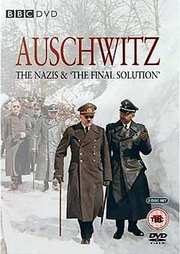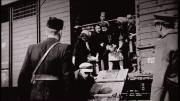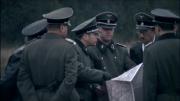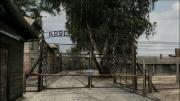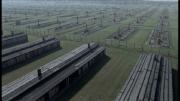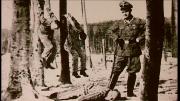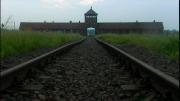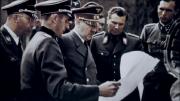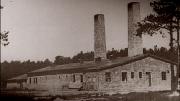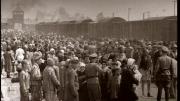Changes made to Review of Auschwitz
Revision 2
Created on Thursday, 28th August 2008, 13:20
Change Submitted by Si Wooldridge
List of Changes:
-
Change #1 - 065]
<newline>[b[b][small]Int - Change #2 - eally.[/small][/b][/heading]
-
Change #3 - ng]
<newline>
<newline>[
/bheading]Conclus - Change #4 - nclusion[/heading] <newline>The wh
Revision 1
Created on Thursday, 28th August 2008, 13:17
Change Submitted by Si Wooldridge
List of Changes:
-
Change #1 - rk.
Should I just go with the DVDs sent to me, should I pick out one of my favourite films? If so, which one. I couldn`t decide and then in a flash of inspiration I decide to take another tack. I would take another look at something that affected me emotionally and intellectually, and only one thing has done this in the past year. <newline> <newline>Laurence Rees is a brilliant (in my view) documentary maker. Cutting his teeth on the excellent Timewatch series on the BBC, Rees has since made a mark with two of his own series: 1997`s The Nazis: A Warning From History and now in 2005, Auschwitz: The Nazis and the `Final Solution. The latter not only moved me to watch the entire series, nearly always in respectful silence, but also inspired me to purchase the DVD set and the accompanying book. This was a first for me, although I`ve also bought Rees` first documentary series as well. <newline> <newline>This series consists of six episodes: <newline> <newline>1. Surprising beginnings <newline>2. Orders & initiatives <newline>3. Factories of death <newline>4. Corruption <newline>5. Frenzied killing <newline>6. Liberation &Should I just go with the DVDs sent to me, should I pick out one of my favourite films? If so, which one. I couldn`t decide and then in a flash of inspiration I decide to take another tack. I would take another look at something that affected me emotionally and intellectually, and only one thing has done this in the past year. <newline> <newline> <newline> [imgmc=0000203966.jpg|0000107066] <newline>Laurence Rees is a brilliant (in my view) documentary maker. Cutting his teeth on the excellent Timewatch series on the BBC, Rees has since made a mark with two of his own series: 1997`s The Nazis: A Warning From History and now in 2005, Auschwitz: The Nazis and the `Final Solution. The latter not only moved me to watch the entire series, nearly always in respectful silence, but also inspired me to purchase the DVD set and the accompanying book. This was a first for me, although I`ve also bought Rees` first documentary series as well. <newline> <newline> <newline> [imgmc=0000203964.jpg|0000107064] <newline>This series consists of six episodes: <newline> <newline>1. Surprising beginnings <newline>2. Orders &amp; initiatives <newline>3. Factories of death <newline>4. Corruption <newline>5. Frenzied killing <newline>6. Liberation &amp; - Change #2 - e killed <newline> <newline> <newline> [imgmc=0000203971.jpg|0000107071] <newline>The total nu
-
Change #3 - hs.
Some of the latter two were both in black and white and colour. Obviously some of the older stuff is not all of great quality, but the vast majority of this looks in superb condition. The picture is clear, much clearer than I remember seeing on TV at the time. Some really good work done here. <newline> <newline>[heading]Audio[/heading] <newline>A Dolby Digital 2.0 soundtrack that does the job and does it well. It`s fundamentally a narration piece with interspersed interviews and a few dramatical reconstructions with dialogue, and it all sounds good and has comprehensive English subtitles. <newline> <newline>[/page1] <newline>[page2] <newline>[heading]Features[/heading] <newline>Interview with Laurence Rees – really interesting interview with the documentary maker where he gives some of the background to his work on this series and also answers some searching questions on events that happened around this part of history. One insight he does offer is the complete lack of remorse from ex-Nazi`s (if there is such a thing). Rees states that he has interviewed many old Communists from the Stalin era who will defend their actions with phrases like "We were only following orders" or "If we didn`t, then we would die as well". Rees tended to find that ex-Nazi`s showed no remorse and had no excuses for participating in these horrific crimes, just that at the time they believed it was the right thing to do. Extraordinary really. <newline> <newline>[heading]Conclusion[/heading] <newline>The whole of the Nazi/Third Reich era has always fascinated me. I have lived in Germany as both a member and the son of a member of the British Armed Forces. Whilst living there in 1983/84, I studied the pre-war Germany, the rise of the National Socialists, its impact on German society and the global ramifications of this unchecked change. As a member of the Scout movement, I used to camp in a wood in Sennelager near Paderborn that was supposed to have been some kind of prison complex during these times. Remains of walls were still in place and you could only wonder what had happened there. <newline> <newline>Before I go further, I should mention that the fascination I feel is not the obvious flash uniforms, Blitzkrieg, Iron Crosses and swastika memorabilia kind of fascination that neo-Nazi type sympathisers hold. I have nothing of that sort in my house. The fascination I hold is how on earth a country could get so low that the conditions arose that would not only bring a corrupt and incompetent regime to power, but also allow it to carry out the most horrendous treatment of people and crimes (whether during wartime or not). There are always evil people in existence and opportunists who just need the right conditions to follow a different calling and earn their place in history as a monster. The likes of Himmler and Eichmann might never have become synonymous with the deaths of so many people of different races and religions if the countries who were supposed to be watching Germany had done their jobs properly. As it is, they will never be forgotten and deserve not to be, but only as a reminder to the utter evil and deprivation that man can inflict on his fellow man. <newline> <newline>This series looks at the surprising beginnings of Auschwitz, explaining that it wasn`t actually set up originally to house and kill Jews (which came a couple of years later). Originally it was to house Soviet prisoners of war, and most of them were killed within a short time of arriving. Originally Jews sent East from Germany were housed in appalling conditions in the Warsaw ghetto`s, where people learnt not to trust each other as they all strove to survive. Corruption, even amongst themselves, was a problem with Jews placed in positions of authority looking after their own interests rather than those of their people. This corruption stemmed mainly from the actions of those who had incarcerated them though, nothing should detract from that fact. <newline> <newline>The eye witness interviews are very powerful, whether from survivors of the horrors or from those who were there in uniform. The survivors put up with degrading and horrific conditions where they just did their best to survive, not sure when it was to be their turn and often knowing that their relatives had already died in the gas chambers, execution pits or crematoria. They all still carry powerful memories of this time, and retelling their stories clearly has a toll emotionally. In contrast, the uniformed inhabitants interviewed don`t seem to have any remorse at all, even if they do realise now (in some cases) that the actions taken were very wrong. Of those who recognise the wrongs, most just palm off the question of remorse/guilt as simply believing it was right at the time and that it is of no real consequence now. Those actions are in the past and belong there, seems to be the argument; it was who they were then but not now, so it`s pointless asking them about it. <newline> <newline>The striking thing for me, aside from the pointless mass exterminations, was how the killing apparatus of the SS was viewed technically and emotionally. Members of the SS approached the killing of millions of people as a simple exercise and constantly strived to make it ever more efficient. At first many were simply lined up and shot by soldiers of the SS, actions which inevitably led to psychological problems (as it should if you kill many people in cold blood). Rather than examine whether the actions were right or justified, the Nazi`s instead looked to make a mass killing machine where no-one directly killed anyone. So in came the converted trucks, the gas chambers with Zyklon B and the crematoria. Of course, with so many bodies to dispose of, the same psychological problems would have arisen in the soldiers manning the camps. So the Sonderkomando was formed from existing Auschwitz prisoners who were made to remove the bodies from the gas chambers and then burn them. These Sonderkommando were not volunteers and knew that they had to do this job in order to prolong their own lives. In the words of one of these men when questioned about the conditions they were forced to work under, "You can get used to anything." <newline> <newline>To add insult to injury, not only were the Nazi administrators of Auschwitz killing off many of their charges within hours of their arrival, they also stole wholesale from them. All luggage was confiscated and placed in a section of the camp called Canada (named simply because that country was thought to have untold wealth), and then selected prisoners would have to search all these belongings (as well as those recovered from the bodies of those killed) for valuables. This section was a popular posting for the soldiers and many pilfered things for their own benefit, with the rest going into the coffers of the Reich. There was a point where the problem got so bad that a team were sent to Auschwitz to investigate the thefts, which was a bit of an irony lost on the Nazi`s themselves. <newline> <newline>One of the saddest things about Auschwitz was what those who miraculously survived found upon their release. Returning to their home towns, they found that their homes and possessions had been taken by others and that they were no longer welcome. These actions and their acceptance by society as a whole are just as bad as those which gave Auschwitz its initial mandate, and in light of this evidence is it any wonder that the Jews felt that their only hope was to found their own state? <newline> <newline>This is truly a remarkable series, Rees has provided us with another landmark documentary series with truly remarkable research and stories to tell. I see no good reason why Auschwitz should not be added to the national curriculum for History in schools; it`s that important a series. As I say I touched on it at school myself with only written material as reference, and this would enforce the points and hopefully ensure that future generations learn the truth and detail of what happened here. <newline> <newline>A must see… <newline>[/page2] <newline>Some of the latter two were both in black and white and colour. Obviously some of the older stuff is not all of great quality, but the vast majority of this looks in superb condition. The picture is clear, much clearer than I remember seeing on TV at the time. Some really good work done here. <newline> <newline> <newline> [imgmc=0000203962.jpg|0000107062] <newline>[heading]Audio[/heading] <newline>A Dolby Digital 2.0 soundtrack that does the job and does it well. It`s fundamentally a narration piece with interspersed interviews and a few dramatical reconstructions with dialogue, and it all sounds good and has comprehensive English subtitles. <newline> <newline>[/page1] <newline>[page2] <newline>[heading]Features[/heading] <newline>[heading] [imgmc=0000203965.jpg|0000107065] <newline>[b]Interview with Laurence Rees – really interesting interview with the documentary maker where he gives some of the background to his work on this series and also answers some searching questions on events that happened around this part of history. One insight he does offer is the complete lack of remorse from ex-Nazi`s (if there is such a thing). Rees states that he has interviewed many old Communists from the Stalin era who will defend their actions with phrases like "We were only following orders" or "If we didn`t, then we would die as well". Rees tended to find that ex-Nazi`s showed no remorse and had no excuses for participating in these horrific crimes, just that at the time they believed it was the right thing to do. Extraordinary really.[/heading] <newline> <newline>[/b]Conclusion <newline>The whole of the Nazi/Third Reich era has always fascinated me. I have lived in Germany as both a member and the son of a member of the British Armed Forces. Whilst living there in 1983/84, I studied the pre-war Germany, the rise of the National Socialists, its impact on German society and the global ramifications of this unchecked change. As a member of the Scout movement, I used to camp in a wood in Sennelager near Paderborn that was supposed to have been some kind of prison complex during these times. Remains of walls were still in place and you could only wonder what had happened there. <newline> <newline>Before I go further, I should mention that the fascination I feel is not the obvious flash uniforms, Blitzkrieg, Iron Crosses and swastika memorabilia kind of fascination that neo-Nazi type sympathisers hold. I have nothing of that sort in my house. The fascination I hold is how on earth a country could get so low that the conditions arose that would not only bring a corrupt and incompetent regime to power, but also allow it to carry out the most horrendous treatment of people and crimes (whether during wartime or not). There are always evil people in existence and opportunists who just need the right conditions to follow a different calling and earn their place in history as a monster. The likes of Himmler and Eichmann might never have become synonymous with the deaths of so many people of different races and religions if the countries who were supposed to be watching Germany had done their jobs properly. As it is, they will never be forgotten and deserve not to be, but only as a reminder to the utter evil and deprivation that man can inflict on his fellow man. <newline> [imgmc=0000203960.jpg|0000107060] <newline>This series looks at the surprising beginnings of Auschwitz, explaining that it wasn`t actually set up originally to house and kill Jews (which came a couple of years later). Originally it was to house Soviet prisoners of war, and most of them were killed within a short time of arriving. Originally Jews sent East from Germany were housed in appalling conditions in the Warsaw ghetto`s, where people learnt not to trust each other as they all strove to survive. Corruption, even amongst themselves, was a problem with Jews placed in positions of authority looking after their own interests rather than those of their people. This corruption stemmed mainly from the actions of those who had incarcerated them though, nothing should detract from that fact. <newline> <newline>The eye witness interviews are very powerful, whether from survivors of the horrors or from those who were there in uniform. The survivors put up with degrading and horrific conditions where they just did their best to survive, not sure when it was to be their turn and often knowing that their relatives had already died in the gas chambers, execution pits or crematoria. They all still carry powerful memories of this time, and retelling their stories clearly has a toll emotionally. In contrast, the uniformed inhabitants interviewed don`t seem to have any remorse at all, even if they do realise now (in some cases) that the actions taken were very wrong. Of those who recognise the wrongs, most just palm off the question of remorse/guilt as simply believing it was right at the time and that it is of no real consequence now. Those actions are in the past and belong there, seems to be the argument; it was who they were then but not now, so it`s pointless asking them about it. <newline> [imgmc=0000203968.jpg|0000107068] <newline>The striking thing for me, aside from the pointless mass exterminations, was how the killing apparatus of the SS was viewed technically and emotionally. Members of the SS approached the killing of millions of people as a simple exercise and constantly strived to make it ever more efficient. At first many were simply lined up and shot by soldiers of the SS, actions which inevitably led to psychological problems (as it should if you kill many people in cold blood). Rather than examine whether the actions were right or justified, the Nazi`s instead looked to make a mass killing machine where no-one directly killed anyone. So in came the converted trucks, the gas chambers with Zyklon B and the crematoria. Of course, with so many bodies to dispose of, the same psychological problems would have arisen in the soldiers manning the camps. So the Sonderkomando was formed from existing Auschwitz prisoners who were made to remove the bodies from the gas chambers and then burn them. These Sonderkommando were not volunteers and knew that they had to do this job in order to prolong their own lives. In the words of one of these men when questioned about the conditions they were forced to work under, "You can get used to anything." <newline> <newline>To add insult to injury, not only were the Nazi administrators of Auschwitz killing off many of their charges within hours of their arrival, they also stole wholesale from them. All luggage was confiscated and placed in a section of the camp called Canada (named simply because that country was thought to have untold wealth), and then selected prisoners would have to search all these belongings (as well as those recovered from the bodies of those killed) for valuables. This section was a popular posting for the soldiers and many pilfered things for their own benefit, with the rest going into the coffers of the Reich. There was a point where the problem got so bad that a team were sent to Auschwitz to investigate the thefts, which was a bit of an irony lost on the Nazi`s themselves. <newline> [imgmc=0000203970.jpg|0000107070] <newline>One of the saddest things about Auschwitz was what those who miraculously survived found upon their release. Returning to their home towns, they found that their homes and possessions had been taken by others and that they were no longer welcome. These actions and their acceptance by society as a whole are just as bad as those which gave Auschwitz its initial mandate, and in light of this evidence is it any wonder that the Jews felt that their only hope was to found their own state? <newline> <newline>This is truly a remarkable series, Rees has provided us with another landmark documentary series with truly remarkable research and stories to tell. I see no good reason why Auschwitz should not be added to the national curriculum for History in schools; it`s that important a series. As I say I touched on it at school myself with only written material as reference, and this would enforce the points and hopefully ensure that future generations learn the truth and detail of what happened here. <newline> <newline>A must see… <newline> [imgmc=0000203963.jpg|0000107063] <newline> <newline>[/page2]
Initial Version
Created on Saturday, 19th November 2005, 16:01
First Submitted by Si Wooldridge
